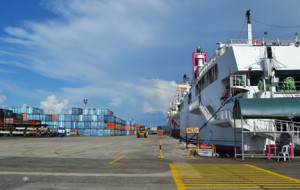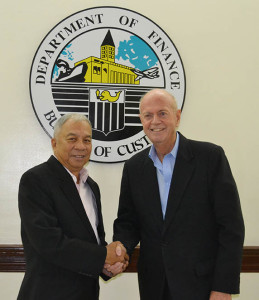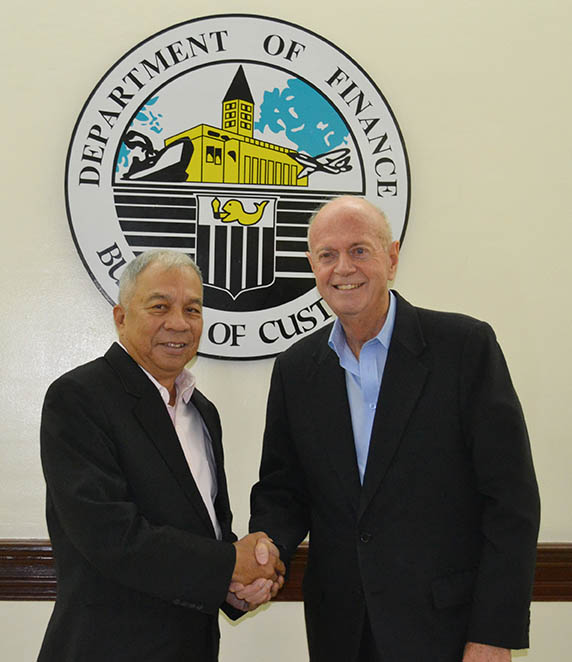 The Bureau of Customs (BOC) has awarded Manila North Harbour Port, Inc. (MNHPI), operator of domestic terminal North Port, a certificate of authority to operate as an Authorized Customs Facility (ACF).
The Bureau of Customs (BOC) has awarded Manila North Harbour Port, Inc. (MNHPI), operator of domestic terminal North Port, a certificate of authority to operate as an Authorized Customs Facility (ACF).
As an ACF, MNHPI will now be able to handle international cargoes at North Port. Prior to the awarding of the certificate, North Port processed only domestic general and containerized cargo. It joins two other Port of Manila facilities—Manila International Container Terminal and Manila South Harbor—able to handle foreign shipments.
The certificate of authority was granted after MNHPI complied with provisions of Customs Memorandum Order (CMO) No. 30-2015, issued last September, which provides the rules and regulations for the establishment, supervision, and control of wharves, container yards, container freight stations, warehouses, examination areas, and other facilities in customs zones.
READ: BOC gets tough on warehouses, other customs facilities
North Port is the third facility in the country granted ACF status by the BOC following two Davao-based ports, Davao International Container Terminal and Terminal Facilities Services Corp.
READ: Davao terminals become first two BOC-accredited authorized customs facilities
“Having been awarded this status, Customs puts its trust on MNHPI in handling and storing imported goods that are immediately discharged from the arriving airplane, vessel and other means of international transport,” Customs deputy commissioner for Assessment and Operations Atty Agaton Teodoro Uvero said in a statement.
As an ACF, MNHPI has the ability to operate within the parameters of an Authorized Economic Operator program established under the World Customs Organization Framework of Standards to Secure and Facilitate Global Trade and the World Trade Organization Trade Facilitation Agreement. These ensure integrity and security of trade facilitation from supply source to customs clearance to final distribution, BOC said.
Asked if allowing MNHPI to handle international cargoes at North Port is in conflict with the company’s contract with the Philippine Ports Authority (PPA) to provide domestic cargo-handling services at the same port, Uvero explained it is within BOC’s power to authorize any facility to handle foreign goods and that it has done so in the past for some private wharves and terminals, whether or not they have been granted PPA concession, through special permits and on a per shipment basis.
He noted that before MNHPI won the concession to operate North Port as a domestic terminal in 2010, the facility had already handled foreign cargoes and hosted its own customs offices. The offices were later transferred when MNHPI stopped handling foreign goods, save for transhipments.

Richard Barclay, chief executive officer of MNHPI, said they are looking at three areas within North Port to store international cargoes but did not say when the facility will start accommodating such shipments.
He stressed that MNHPI will “not jeopardize” domestic cargo volumes in favor of international volumes and assured that the terminal has ample capacity to handle both domestic and foreign cargoes.
North Port’s annual capacity is 2 million twenty-foot equivalent units (TEUs). It already handles 1 million TEUs yearly.
Cost savings
Barclay noted that with North Port being able to handle foreign cargoes, shippers can save on hustling costs. Foreign containers can also easily be moved berth to berth from the foreign vessel to the domestic ship, Barclay said.
As an ACF facility, MNHPI must have verifiable procedures on its security procedures for service providers and vendors, container security integrity and breach detection measures (e.g. container storage and seals), and physical access controls (e.g. security personnel, employee ID system, searches, visitor/vendor verification).
Personnel security, security training and awareness, IT security are also strictly considered. This goes as well for physical security such as fences, gates, parking, building structures, locks and keys, lighting, alarm systems and video surveillance cameras.
Authorization may be revoked or suspended if the facility stores smuggled goods; is involved in pilferage; has unaccounted for cargoes; overcharges; and violates customs laws, rules and regulations; and other laws of the Philippines. – Roumina Pablo





